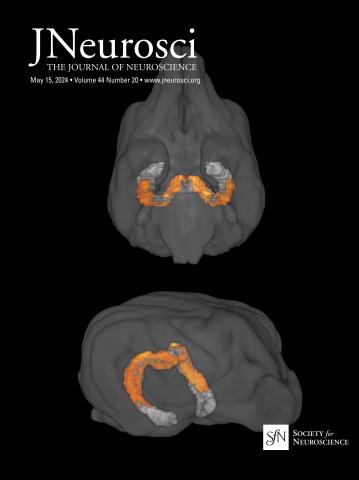Largely Intact but Less Reliable and Distributed Neural Representations of Subjective Value in Human Opioid Addiction.
IF 4
2区 医学
Q1 NEUROSCIENCES
引用次数: 0
Abstract
Addiction, particularly opioid use disorder (OUD), is often characterized by heightened propensity for risk-taking. While tolerance for risk and uncertainty varies across individuals, the elevated risk-taking in people with OUD is assumed to stem from altered cognitive decision-making processes beyond differences due to idiosyncratic yet lawful tolerances. Specifically, the prevailing assumption is that people with addiction exhibit impairments in the internal representation and integration of information that should guide decisions and judgements about what is valuable. Using model-based fMRI, we examined how the choice behavior of treatment-engaged male and female participants with chronic OUD aligns with the neural encoding of their inferred subjective value of uncertain (risky and ambiguous) rewards and the evidence for impairment in this neural process. Using both univariate and multivariate analyses, we found that canonical value regions (ventromedial prefrontal cortex, striatum, and posterior cingulate cortex) track the subjective value of uncertain choice options in both participants with OUD and comparison controls, irrespective of their tolerance for uncertainty. This speaks against a fundamentally impaired subjective valuation process in OUD. However, value representations were less reliably decodable in people with OUD in some value regions (ventromedial prefrontal cortex) and throughout the brain, especially within the limbic and salience/ventral-attention networks. Thus, while people with OUD engage a neurocomputationally similar process during risky decision-making to controls, they may differ in the fidelity and distribution of subjective value signals across brain networks.Significance statement A common assumption in addiction neuroscience is that people with substance use disorders have impaired encoding or computation of the value of their options and consequently might engage in risky behaviors over less risky alternatives. Empirical support for this viewpoint however remains lacking, potentially hindering the translation of research into improved understanding and treatment of addiction. This study shows the valuation of risky decisions is largely neurally intact, though less reliable and distributed throughout the brain, in people with opioid use disorder. Thus, rather than impaired valuation, addiction may be associated with a less robust, and spatially more restricted, representation of value. These findings highlight network-level mechanisms that shape decision-making, and suggest new targets for future addiction research and treatment.人类阿片类药物成瘾中主观价值的基本完整但不太可靠的分布式神经表征。
成瘾,特别是阿片类药物使用障碍(OUD),通常以高风险倾向为特征。虽然个体对风险和不确定性的容忍度各不相同,但OUD患者的高风险被认为源于认知决策过程的改变,而不是由于特殊但合法的容忍度差异。具体来说,普遍的假设是,成瘾者在内部表征和信息整合方面表现出障碍,这些信息应该指导人们做出有价值的决定和判断。使用基于模型的功能磁共振成像,我们研究了慢性OUD患者的选择行为如何与他们对不确定(风险和模糊)奖励的推断主观价值的神经编码以及该神经过程损伤的证据相一致。通过单变量和多变量分析,我们发现典型价值区域(腹内侧前额叶皮层、纹状体和后扣带皮层)追踪不确定选择选项的主观价值,而不管他们对不确定性的耐受性如何。这与OUD的主观评估过程从根本上受损相悖。然而,在某些价值区域(腹内侧前额叶皮层)和整个大脑中,特别是在边缘和突出/腹侧注意网络中,OUD患者的价值表征的可解码性较差。因此,虽然OUD患者在风险决策过程中与控制组的神经计算过程相似,但他们在主观价值信号在大脑网络中的保真度和分布可能有所不同。成瘾神经科学的一个普遍假设是,患有物质使用障碍的人对其选择的价值的编码或计算能力受损,因此可能会从事风险行为,而不是风险较小的选择。然而,对这一观点的实证支持仍然缺乏,这可能会阻碍将研究转化为改善对成瘾的理解和治疗。这项研究表明,阿片类药物使用障碍患者对风险决策的评估在很大程度上是神经完整的,尽管不太可靠,而且分布在整个大脑中。因此,成瘾可能与不那么稳健、空间上更受限制的价值表现有关,而不是价值受损。这些发现强调了影响决策的网络层面机制,并为未来的成瘾研究和治疗提出了新的目标。
本文章由计算机程序翻译,如有差异,请以英文原文为准。
求助全文
约1分钟内获得全文
求助全文
来源期刊

Journal of Neuroscience
医学-神经科学
CiteScore
9.30
自引率
3.80%
发文量
1164
审稿时长
12 months
期刊介绍:
JNeurosci (ISSN 0270-6474) is an official journal of the Society for Neuroscience. It is published weekly by the Society, fifty weeks a year, one volume a year. JNeurosci publishes papers on a broad range of topics of general interest to those working on the nervous system. Authors now have an Open Choice option for their published articles
 求助内容:
求助内容: 应助结果提醒方式:
应助结果提醒方式:


